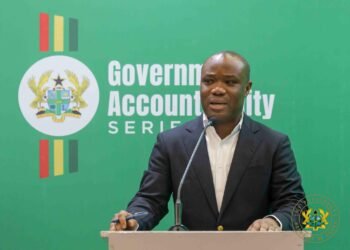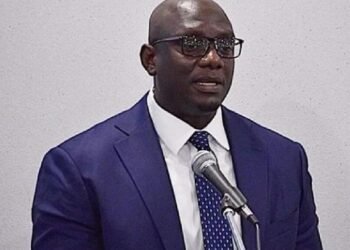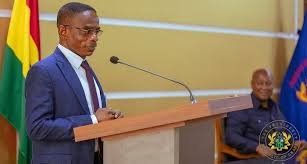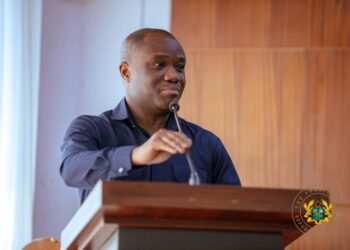In a recent interview with the Vaultz News, Dr Thomas Prehi Botchway, a Political Science Lecturer at the University of Education, Winneba, and former Adjunct Law Lecturer at KAAF University College, expressed support for Speaker of Parliament, Rt. Hon. Alban Bagbin’s decision to indefinitely adjourn the parliamentary session.
The adjournment, citing a lack of quorum, followed Speaker Bagbin’s earlier declaration of four parliamentary seats as vacant, and the subsequent Supreme Court’s stay of execution, which has intensified concerns regarding judiciary interference in parliamentary affairs.
Dr. Botchway, offering his initial reaction, highlighted the adherence to constitutional provisions in Bagbin’s decision. He emphasized that in Ghana’s constitutional democracy, the Speaker acted within the bounds of the law.
“Ghana is a democratic country and we operate based on a constitution; it’s a constitutional democracy. And so if you want to put it in that perspective, I would say that he did not err in what he did. He has gone by the constitutional provisions that we have”.
Dr Thomas Prehi Botchway, Political Science Lecturer at the University of Education Winneba
Dr. Botchway further pointed out that those expecting the Speaker to side with either the New Patriotic Party (NPP) or the National Democratic Congress (NDC) were bound to be disappointed. “Since he acted according to the Constitution, we should be fine. That’s what constitutional democracies expect,” he noted.
The decision by Speaker Bagbin to adjourn the session indefinitely was grounded in Articles 102 and 104 of Ghana’s 1992 Constitution, which govern parliamentary quorum and decision-making.
Explaining the significance of these articles, Dr Botchway reiterated the importance of constitutional compliance in the conduct of parliamentary business.
According to him, Parliament requires at least half of its members present to make decisions under Article 104, arguing that the failure to meet this requirement justified the Speaker’s adjournment, which aligns with the constitutional mandate.
“The constitution is supreme, so if there are constitutional provisions as to how business in parliament should be conducted, and when and how business should be conducted in terms of the number of parliamentarians being in the house, then, of course, the evidence points to the fact that they did not have the required number of parliamentarians in the house to take decisions on national issues.”
Dr Thomas Prehi Botchway, Political Science Lecturer at the University of Education Winneba
He further stressed that having a quorum for parliamentary sitting under Article 102 does not automatically permit decision-making in the name of the republic, a critical distinction enshrined in Article 104.
The Speaker’s Use of Discretion
Addressing the Speaker’s decision not to ring the bell and summon MPs to the chamber before adjourning, Dr Botchway defended Bagbin’s use of discretion.
“He has every right to exercise discretion as to whether he wants to ring the bell or not,” he remarked, adding that the Speaker’s actions were likely intended to buy time for parliamentary leadership to address ongoing political tensions.
Speaker Bagbin’s handling of the situation, in Dr. Botchway’s view, demonstrated his political experience and strategic thinking.
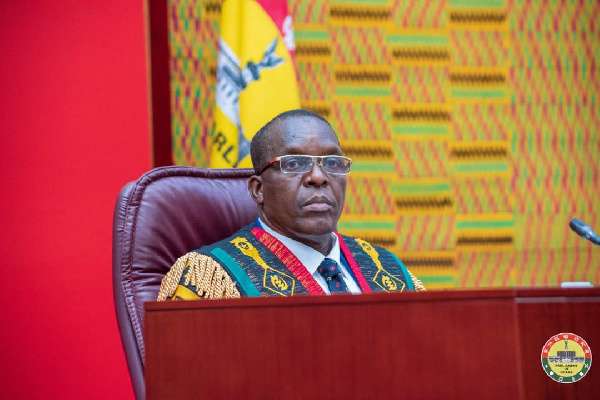
Consequences of the Adjournment
While Dr Botchway acknowledged the legality of the Speaker’s action, he did not downplay its impact.
The indefinite adjournment, he noted stalls critical legislative business, including addressing strikes and public outcry against Legislative Instrument (LI) 2462, which permits mining in forest reserves and river bodies.
“Parliament is supposed to also be serving as a check on government activities, their spending and what have you. All these things are now going to be on hold because parliament is not in session”.
Dr Thomas Prehi Botchway, Political Science Lecturer at the University of Education Winneba
Despite these setbacks, he was quick to caution against flouting constitutional provisions to expedite legislative work. He argued that allowing Parliament to conduct business without the required quorum would violate the Constitution, exposing the institution to legal challenges.
“If …the parliament of Ghana sat to take decisions without the required number, someone could sue them for breaching the Constitution,” Dr Botchway warned.
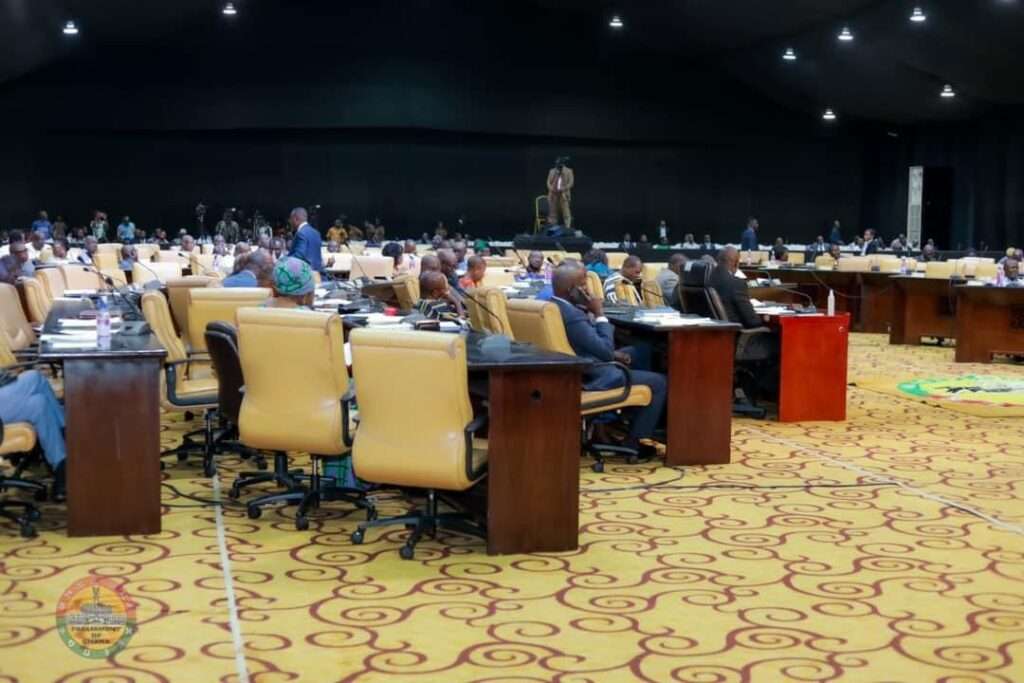
Judicial and Legislative Tensions
When asked about the Speaker’s previous declaration of four parliamentary seats as vacant and the subsequent stay of execution by the Supreme Court, Dr Botchway noted the complex interplay between the judiciary and Parliament.
He underscored that while the judiciary has the power to interpret the Constitution, the Speaker is equally vested with the authority to make such decisions based on constitutional provisions.
Drawing on Article 97 of the Constitution, Dr Botchway detailed the legal basis for the Speaker’s declaration, particularly concerning MPs who defect from their parties or change their political affiliation.
“Per the reading of Article 97(h), the independent MP who joined a political party [the NPP] should vacate his seat,” Dr Botchway clarified, adding that similarly, the other three MPs, who crossed party lines, also fall under this provision, justifying Speaker Bagbin’s ruling.
However, the lecturer acknowledged the constitutional dilemma posed by the judiciary’s intervention.
He pointed out that while the Speaker acted within his rights under Article 97, the Supreme Court’s stay of execution complicates matters, especially given its constitutional mandate to interpret the law. “We cannot say the Speaker is entirely right, nor can we say the judiciary is entirely right,” Dr Botchway reflected.
He pointed to Article 99, which grants the High Court jurisdiction over certain parliamentary matters, questioning whether the Speaker overstepped his authority in declaring the seats vacant.
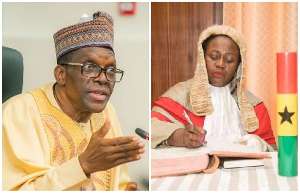
Trust in Ghana’s Democracy and Inconsistent Judicial Decisions
Moreover, Dr Prehi Botchway warned that ongoing legal tussles between the judiciary and Parliament may erode public trust in Ghana’s democratic institutions if not addressed with transparency and fairness.
His remarks came in response to recent legal disputes, raising critical questions about the balance of power between the executive, judiciary, and legislative branches of government.
Dr. Botchway pointed out a concerning inconsistency in the speed with which the judiciary handles sensitive cases.
He highlighted the example of the delayed ruling regarding the compulsory leave imposed on former Auditor-General, Daniel Yaw Domelevo by President Akufo-Addo, decrying the Supreme Court’s failed timely intervention.
“It took the Supreme Court almost two years to deliver a ruling on that matter, by which time Domelevo had already retired. Yet, in another case, we see judgments delivered within 24 hours. This raises serious questions about the fairness and credibility of our institutions”.
Dr Thomas Prehi Botchway, Political Science Lecturer at the University of Education Winneba
He emphasized that these discrepancies could undermine public confidence in the judiciary. “If we want people to trust and respect our institutions, we need to be fair and candid in our judgments and actions. Otherwise, we risk eroding the trust that is critical for the smooth functioning of our democratic system”
The Struggle for Balance Between Judiciary and Parliament
When asked about the potential impact of recent parliamentary adjournments on the relationship between Parliament and the judiciary, Dr. Botchway stressed the need for balance between the two institutions.
He argued that the apparent competition between these arms of government is counterproductive and unnecessary.
“The judiciary and the Legislative are not supposed to be fighting each other. Their role is to serve the people of Ghana. If we understand our roles and functions properly, there will be no need for any competition. Instead, we should focus on ensuring proper checks and balances so that no branch of government exercises power excessively.”
Dr Thomas Prehi Botchway, Political Science Lecturer at the University of Education Winneba
Constitutional Reforms to Curb Political Power Plays
Dr. Botchway also addressed a long-standing constitutional flaw that he believes contributes to the perpetual political power struggles in Ghana.
He argued that the requirement for a minimum of 50% of ministers to be Members of Parliament (MPs) has blurred the lines between the executive and legislative branches, ultimately compromising the separation of powers.
“We are practising a system where executive power is fused with the legislature, which undermines the principles of separation of powers. Until we amend our Constitution, this political power play will continue,”
Dr Thomas Prehi Botchway, Political Science Lecturer at the University of Education Winneba
Dr. Botchway further explained that as long as ruling parties appoint MPs to ministerial positions, opposition MPs will remain sidelined, deepening partisan divisions. He warned of the consequences should one party dominate parliamentary processes.
“Had the Speaker’s ruling on majority composition gone unchallenged, the opposition could have formed a majority in Parliament, leading to significant policy changes, such as the potential abolition of the controversial E-levy.”
Dr Thomas Prehi Botchway, Political Science Lecturer at the University of Education Winneba
Negotiation and the Need for National Interest
In addressing what needs to be done to foster calm in Parliament after its indefinite suspension, Dr Botchway stressed the importance of dialogue and negotiation between the two main political parties, the National Democratic Congress (NDC) and the New Patriotic Party (NPP).
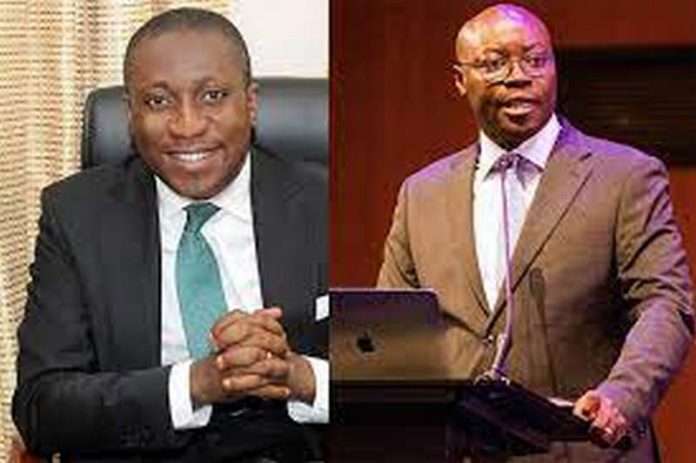
He urged political leaders to prioritize the nation’s interest over partisan agendas.
“They need to sit down and negotiate. If both sides genuinely have the interest of Ghana at heart, this tension can be defused. Parliament is not a theatre for partisan games; it’s a forum for representing the people’s interests. Unfortunately, we often see MPs behaving one way in the chamber and another way outside, which only serves to fool the public.”
Dr Thomas Prehi Botchway, Political Science Lecturer at the University of Education Winneba
Calls for Overhaul of Ghana’s Electioneering System
Dr. Botchway also called for reforms to Ghana’s electioneering system, particularly regarding the duration of election campaigns. He criticized the current system, which allows for prolonged campaigning, at the expense of parliamentary and government duties.
“MPs, ministers, even presidents, spend too much time campaigning when they should be focused on their jobs. We need to reform our system to limit the time allocated for campaigning.
“Countries with more advanced democracies have far shorter campaign periods, and we should follow their example.”
Dr Thomas Prehi Botchway, Political Science Lecturer at the University of Education Winneba
He pointed to the excessive politicking in Ghana, arguing that it distracts leaders from their core responsibilities.
“We are all serving one Ghana in our respective capacities. We need patriotic leaders, not partisan ones. The longer our MPs are away campaigning, the more we delay important decisions that affect the lives of ordinary citizens.”
Dr Thomas Prehi Botchway, Political Science Lecturer at the University of Education Winneba
Final Thoughts, a Call for Accountability
In his closing remarks, Dr Botchway urged Ghana’s MPs to prioritize their legislative responsibilities over political interests. He argued that the indefinite suspension of Parliament could have been avoided if MPs had been present to participate in parliamentary proceedings.
“Our MPs must show up for work. The Speaker had grounds to suspend Parliament, but those grounds existed because MPs did not fulfil their obligations.”
Dr Thomas Prehi Botchway, Political Science Lecturer at the University of Education Winneba
Dr Thomas Prehi Botchway’s analysis of Speaker Bagbin’s adjournment of Parliament underscores the intricate balance between constitutional adherence and the practical implications of parliamentary decisions.
While the indefinite adjournment halts crucial legislative work, Dr. Botchway emphasized that constitutional violations must be avoided at all costs.
He also highlighted the broader legal and political ramifications of the Speaker’s declaration of vacant seats and the Supreme Court’s stay of execution, which has deepened divisions within the legislature.
His comments also underscore the urgent need for reforms and accountability in Ghana’s political system to restore faith in its institutions.
READ ALSO: Israel’s War Sets Gaza’s Development Back By Nearly 70 Years




